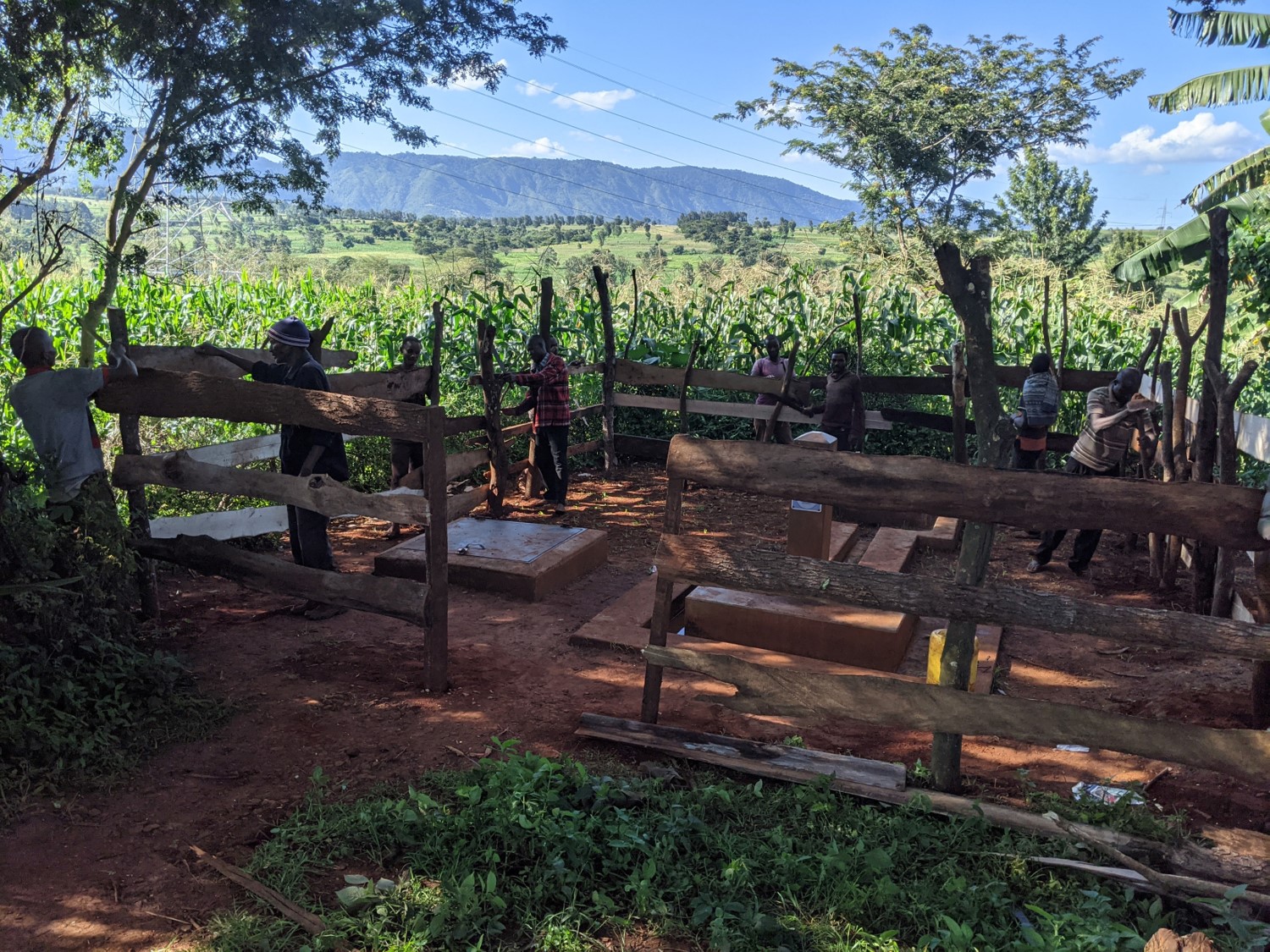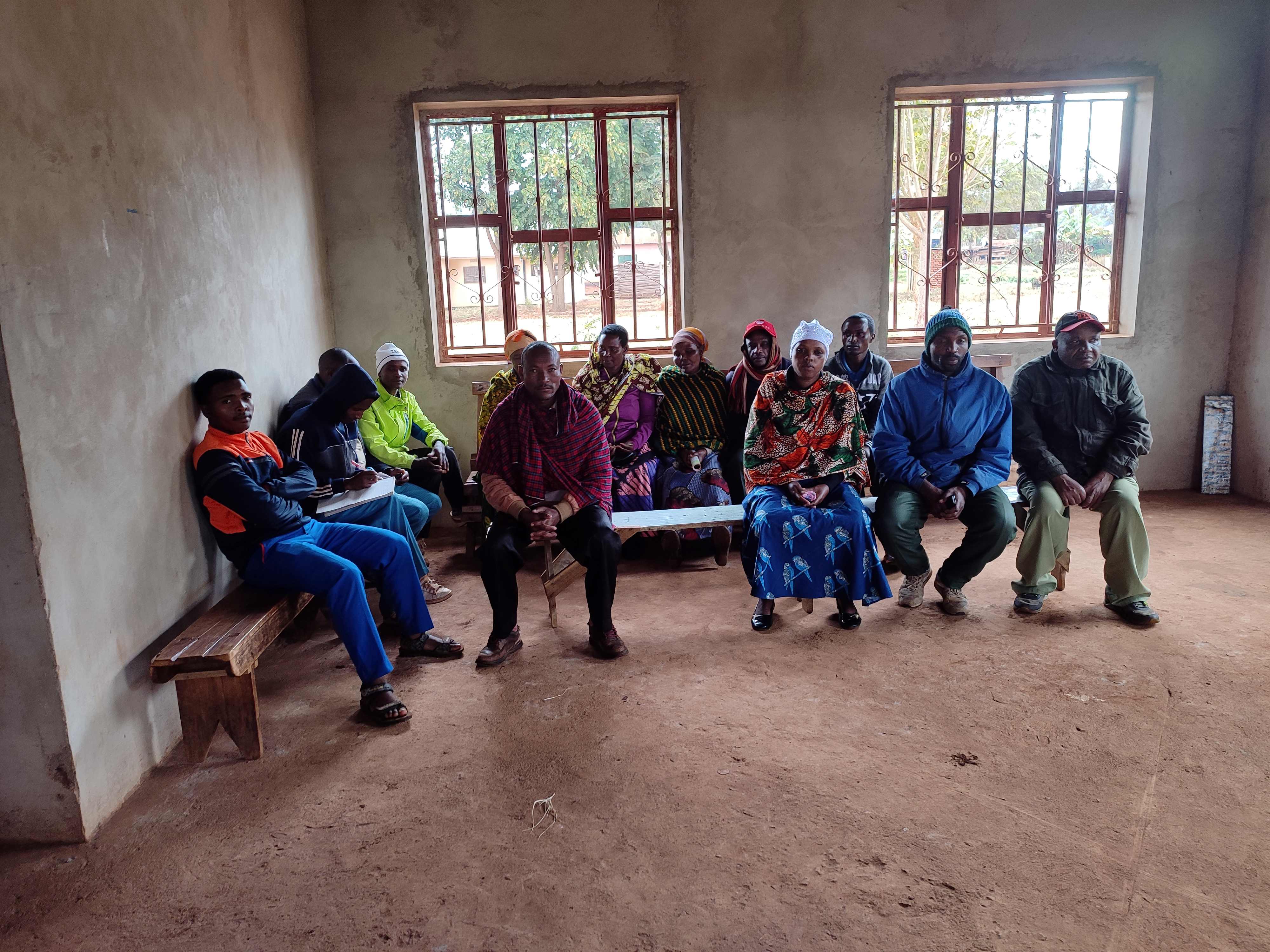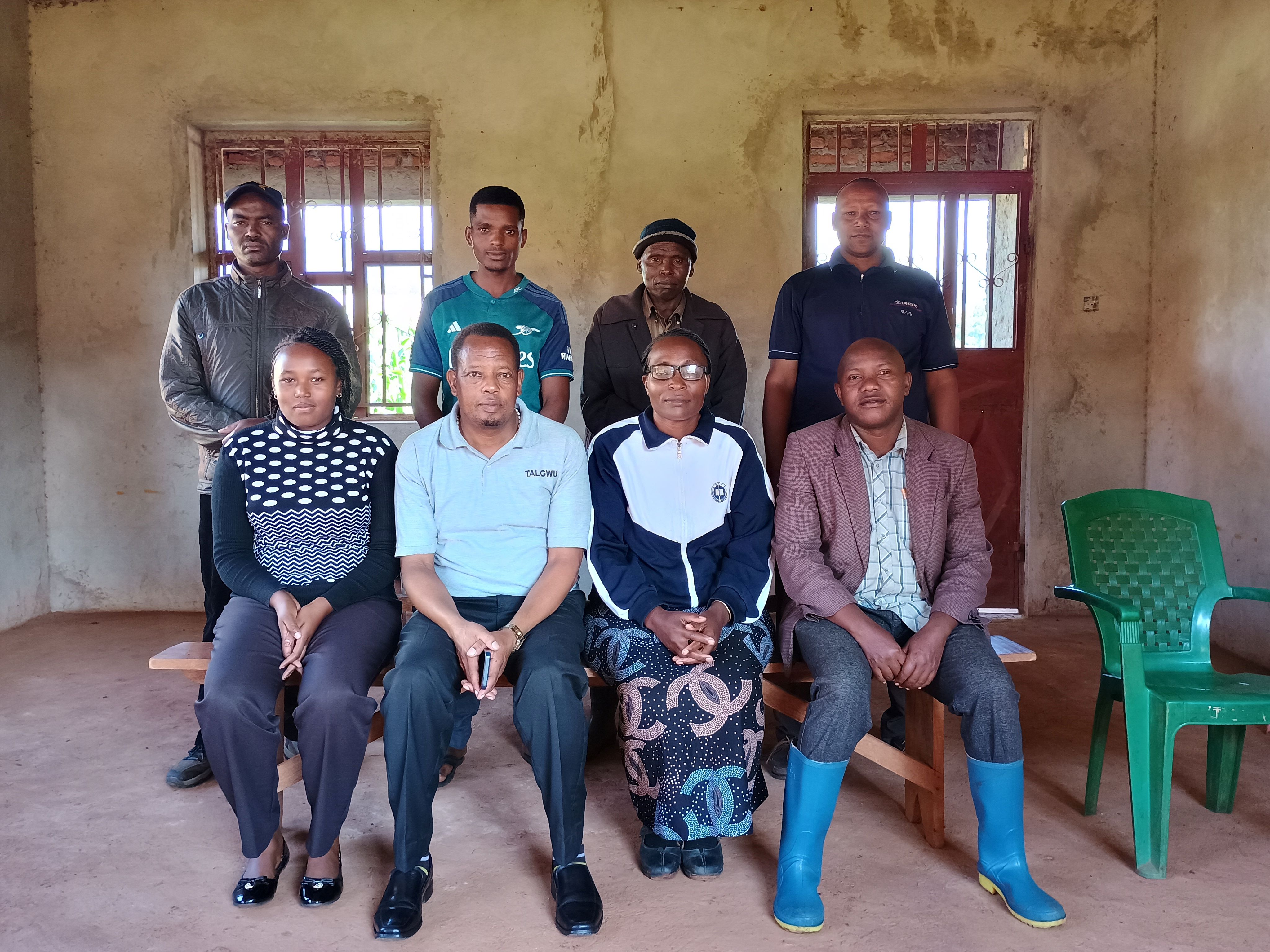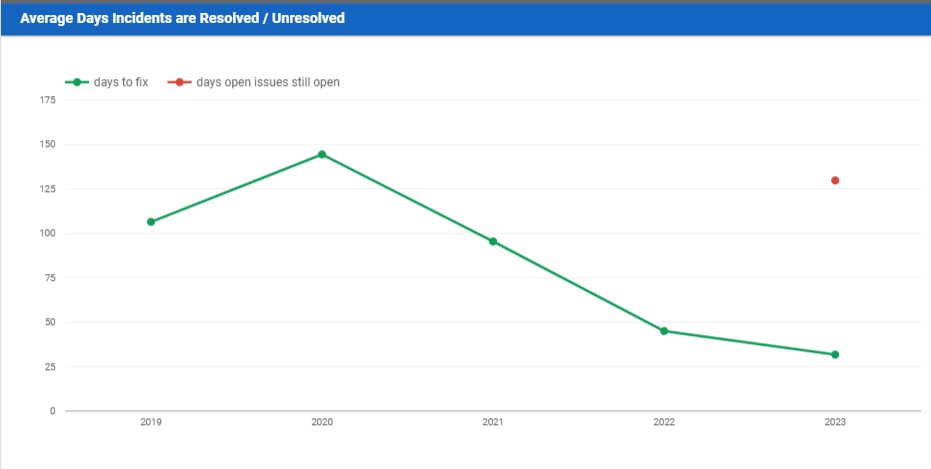Categories:
- ['Sanitation']
Status:
Start Date:
Estimated Cost:
Transfer Water Maintenance Responsibilities to the Community
Assure longevity of Karimu investment and community benefit
The Ayalagaya Water project was the single largest investment and the largest project that Karimu has undertaken prior to 2018. The water infrastructure consists of the water intake and sedimentation tank, 12 storage and distribution tanks, 119 public water points, 621 private water points, and 17 km (~10.5 miles) of main and distribution pipes.

Part of Karimu’s agreement with the community to perform construction projects is the requirement to maintain the investments. We see the transfer of this responsibility in three phases:
-
Phase 1: Karimu leads the monthly management and maintenance of the project and members of the community join us. In the case of the water system maintenance, we worked with the community to form 4 water committees. The Ward Water Committee oversees and coordinates fixes to issues involving multiple wards. The Village Water Committees collect funds from private water points and are responsible for monitoring and maintaining assets wholly contained in their village. Each public water point has a water champion - a community member responsible for inspecting the water point, reporting maintenance issues, ensuring water is not wasted, and that it is used according to our agreement. Water points may only be used for drinking and cooking, not for irrigation nor for sale. People with private water points pay a fee, depending on whether they are a residence or a business. All maintenance is funded by monies collected from private water points. Karimu has implemented a water maintenance dashboard for tracking incidents and their resolution. Karimu and the community can see open and closed incidents by village or subvillage, by month, by asset, etc. New requests for public water points to continue to meet that goal that all households will have clean water within 500m are also funded by the water committees. Private water point construction is funded by that property owner.
-
Phase 2: As the community becomes comfortable with the process, we move to phase 2 where members of the community lead the management and maintenance and Karimu supports them and oversees the process. We do quarterly maintenance checks to ensure the work is being done well and provide feedback to them.
-
Phase 3: When it becomes clear that the members don't need our involvement anymore, we move to phase 3. In phase 3, Karimu has transferred all maintenance to the community and Karimu is not involved at all.
Karimu is in Phase 2 with the water project in Ayalagaya. The water committees and the leaders manage and maintain the water project. Unfortunately, as Karimu has stepped back from monthly monitoring, the community-led volunteer monitoring and maintenance has lagged our expectations. We are working with the district water commission and local leaders to develop a different approach to water asset maintenance, one that does not rely solely on volunteer monitoring and one that devotes more of the money received from private water points to water maintenance.
August 2022 Update: Due to concerns about the sustainability of the water system without Karimu’s engagement, we halted new construction projects in Ayalagaya at the end of 1Q2022 (except for the Health Center, Special Needs Children’s Hostel, and Gajal Primary school). We made specific recommendations to the community:
-
Adding meters to private water points to collect funds based on usage rather than a flat fee
-
Managing water maintenance funds centrally rather than village by village to deal more effectively with cross village maintenance
-
Saving funds from private water points to deal with future, major maintenance issues e.g. rebuilding a tank
-
Hiring fully dedicated employees (paid for by the collected funds) instead of relying on volunteers to manage and administer the maintenance and administration of the water system.
Transitioning to a new management approach has taken time, many conversations and village meetings, as well as discussions with the two water agencies in Tanzania to come to an agreement. However, we finally have! The Chairman of the Ward, and our good friend, has been instrumental in shifting public opinion and those of the leaders of the villages and sub-villages. We have drafted a constitution for the new governing body that has now been approved by each village. The new water committee is composed of 12 people: 2 men and 2 women from each of Ayalagaya’s 3 villages. One sticking point has been the cost of installing meters for the private water points, ~$60,000. To date, private water points were only charged a flat fee, so a water meter was not required. Karimu has agreed to absorb this cost in order to move forward on a fully functional water committee that can manage the water assets effectively into the future. The water committee has elected its leaders and has hired an accountant and a maintenance person to handle the day-to-day activities. The villages are preparing information to hand over to the new committee along with the remaining funds collected from the private water points.
December 2022 Update: We have made significant progress on water management in Ayalagaya. Everything we requested from them was completed, except the opening of the bank account, because they need to be recognized by the government as an organization and that process is ongoing. They have:
-
Formed a single, ward-level committee for all of Ayalagaya with 4 representatives (2 men and 2 women) from each of the 3 villages
-
Hired a certified accountant to manage the money
-
Hired two maintenance technicians with a certification in plumbing and water related work
-
Started to save the unused funds of the project (in 3 months they saved over $10K)
As of year end 2022 there are ZERO open maintenance incidents!

December 2023 Update: We could not be happier with the operation of the Ayalagaya water committee. At year end there were 6 open incidents from 245 reported incidents with an average days to close of 32 days and trending downward. A large number of these incidents were due to the government installation of meters against our agreement which later had to be removed.

The water committee is now fully functional. The committee is effectively collecting funds, managing their bank account for the entire ward, and are ready to handle ongoing maintenance of the system, including saving sufficient funds for large outlays e.g. repairing/replacing/building storage tanks which will surely be in their future at some point.

In December, the region experienced extremely heavy rains. The major damage was the complete washing away of the main pipe that feeds Haysam and Gajal leading to a complete lack of water in these villages. The water committee was very prompt in resolving this issue. We have suggested that they may want to consult with engineers about how to mitigate future similar issues. In addition, there was frequent overflow of silt and debris at the intake. While the tank itself is intact, the water committee, together with the Arri community (who share the intake), and the Arri water project engineer, have had to go to the intake on a regular basis to clean out the silt and debris.
April 2024 Update: As mentioned earlier, Karimu recommended installation of water meters on private water points due to learning that some people were using their private water for irrigation which is against the rules. No irrigation nor sale of water is allowed. To remedy this, private water point users will be shifted from paying a flat fee to paying based on consumption as measured by water meters. While there was hesitance among the community about the water meter installation, local leadership educated the community on the rationale and Karimu agreed to partner with the community to fund the water meter installation paying for the water meters, transportation, fittings, and labor charges for the 300 private water points that did not already have meters. This cost a little over $38,000.

December 2024 Update: Earlier this year the Tanzanian governmental water agency reorganized their water management. In order to scale, the country decided to reduce the number of water committees that they are supporting. Because many water committees manage small areas (e.g. a single ward), the government decided to consolidate several adjacent areas under the management of a single water committee. For Ayalagaya this meant consolidating water management and maintenance with neighboring Arri and Dabil wards.
The current water committee now consists of 8 members. Gratefully, we are seeing that all wards are represented and the committee members are engaged. In addition, the secretary, accounting, and maintenance positions are permanently staffed by 9 fully qualified professionals as we have desired. All funding for maintenance from the private water points now goes to the government. The water committee develops an annual budget which is funded by the government. Our only concern is whether this organization will provide the necessary support for the eventual major financial outlays needed to sustain the project (e.g. a tank replacement), but thus far the committee is operating effectively.
As of mid-December 2024 the Ayalagaya infrastructure includes 927 private water points, 107 public water points, 12 distribution tanks, plus the intake and sedimentation system. Water meters have been installed in all private water points resulting in reduced water consumption and increased water availability with water at all water points 24x7. 154 incidents were reported this year and all have been closed. The average time to fix is at 64 days versus our goals of 45. This is an increase from 2023, but we are attributing this to the transition in the water committee structure mid-year. We will continue to monitor water maintenance and expect to see improvement next year and will hopefully fully close the monitoring by year end 2025.
December 2025: Karimu has witnessed an improvement in the Ayalagaya water project maintenance in the following areas:
-
Timely inspections of the water projects by the artisans
-
Accurate recordings and updates
-
An increase of total number of incidents found to 490 this year
-
Average time to fix issues reduced to only 26 days versus our goal of 45
We had hoped to close the monitoring phase by the end of 2025. However, our target is to reach over 90% of problems identified by the maintenance system (water champions and scheduled inspections) was not met. They identified only 59% this year, so we will continue to monitor the project and hope to be able to close the project in 2026.
Benefits:
-
Community independence and ownership of the water infrastructure
-
Longevity of clean water for the community
Cost:
-
Karimu: $47,419
-
Community: All maintenance


